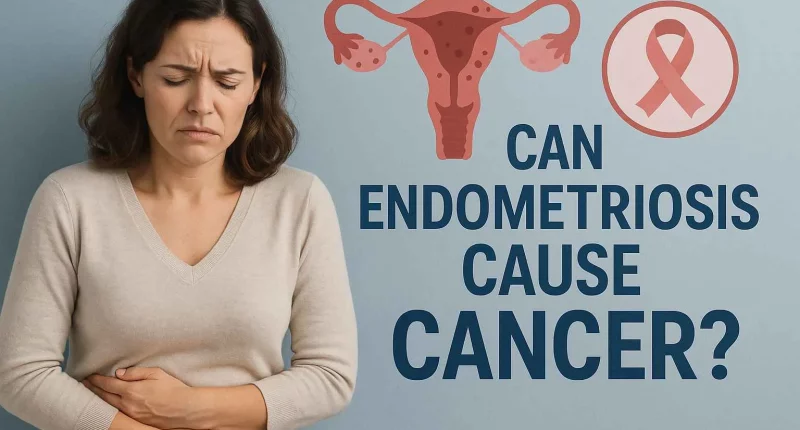Share this @internewscast.com
Endometriosis is frequently dismissed as merely “painful periods.” Yet, for countless women, it represents much more—persistent pain, absences from work, and prolonged periods without clear explanations. These experiences resonate deeply. For some, there’s an underlying concern: could endometriosis lead to cancer? This fear is both genuine and understandable.
Endometriosis itself isn’t cancer. However, studies indicate there are some associations between this condition and specific cancer risks. This doesn’t imply that everyone with endometriosis will develop cancer. It does suggest the importance of being aware of these risks and recognizing what to watch for. Being informed empowers you to take control of your health and make decisions that safeguard your well-being and peace of mind.
Let’s delve into what endometriosis truly entails, its potential connection to cancer, which cancer types have been examined in this context, and what symptoms you should be aware of. This guide provides straightforward answers, grounded in current research. So, let’s dive in!
What Is Endometriosis?
Endometriosis happens when cells similar to the ones inside the uterus grow in places they don’t belong. This might be on the ovaries, fallopian tubes, bladder, intestines, or even the pelvic wall. These patches of tissue are still reactive to hormones. So, every month, during your cycle, they swell and bleed, just like the uterine lining would.
But since the blood has nowhere to go, it gets trapped. Over time, this can lead to scar tissue, cysts, inflammation, and pain. Some people live with minor discomfort. Others can’t work, walk, or function during flare-ups.
Here’s how it usually presents:
It mostly affects women between 30 and 40, though symptoms often start earlier. There’s no cure, but treatments help reduce symptoms and improve quality of life.
Is There a Link Between Endometriosis and Cancer?
This is where the question “Can endometriosis cause cancer?” comes in. And the answer is, it’s complicated.
Endometriosis isn’t cancer. It’s not labeled as a precancerous condition either. But over time, some studies show that endometriosis may increase the risk of developing certain cancers. Especially ovarian cancer. The inflammation and abnormal cell growth associated with endometriosis might contribute to this, though the shift is rare.
Still, overall, research shows that women with endometriosis have more than 4 times the risk of ovarian cancer than those who don’t have it.
This doesn’t mean everyone will get cancer. But if you have long-term endometriosis, especially involving the ovaries, it’s wise to monitor your symptoms closely and stay consistent with medical checkups.
Other potential links are still being studied. Most of the focus remains on ovarian cancer, with less evidence for other types.
Types of Cancer Linked to Endometriosis
Even though the risk of cancer with endometriosis is low, it’s important to know what kinds are most often mentioned in research.
1. Ovarian Cancer
This is the main cancer seen in connection with endometriosis. Specifically, certain subtypes, like clear cell carcinoma and endometrioid carcinoma, are more common in people who’ve had endometriosis for many years. Some of these cases start as endometriosis-associated ovarian carcinoma (EAOC).
This doesn’t mean endometriosis becomes cancer. It simply means that long-term inflammation and hormonal imbalances may create a favorable environment for abnormal cells to grow. Estrogen may play a key role here.
2. Cervical Cancer
The link here is weaker. Some research has explored cervical clear cell carcinoma in women with cervical endometriosis, but there’s no strong or proven connection. Most cervical cancer cases are caused by HPV, not endometriosis.
3. Endometrial Cancer
This one sounds like it should be connected. But it isn’t. Despite the similar names, endometriosis and endometrial cancer are not connected. They involve different tissues. Symptoms like pelvic pain or irregular bleeding may look alike, but their causes and risks aren’t shared.
What Are the Warning Signs of Cancer in Women With Endometriosis?
Here’s the tricky part. Some cancer symptoms overlap with endometriosis symptoms. That makes it easy to miss something serious. If you’ve been living with endometriosis for years, it’s tempting to ignore new pain or fatigue and chalk it up to your condition.
But here’s what you should take seriously:
-
New or increasing pelvic pain that feels different
-
Bloating that doesn’t go away after your period
-
Sudden weight loss without trying
-
Bleeding between periods, especially post-menopause
-
Changes in bowel habits (longer than two weeks)
-
Blood in the stool or urine
-
Constant back pain or pressure in the lower belly
If any of these show up, especially if they’re new or worsening, it’s time to see your doctor. Imaging and blood tests can rule out or catch something early.
Diagnosing Endometriosis vs. Cancer
These two aren’t always easy to tell apart. Here’s a quick comparison of how doctors usually go about finding each one:
|
Feature |
Endometriosis Diagnosis |
Cancer Diagnosis |
|
Common Exams |
Pelvic exam, medical history |
Medical history, physical exam |
|
Imaging |
Ultrasound, MRI, sometimes CT |
CT, MRI, ultrasound, PET scans |
|
Lab Tests |
Not always used, may check hormone levels |
Blood work, cancer markers |
|
Surgical Methods |
Laparoscopy is gold standard |
Biopsy (from tumor or suspected tissue) |
|
Time to Diagnose |
Often delayed, takes years for many |
Depends on type and stage of cancer |
|
Early Detection Tools |
Limited; diagnosis often delayed |
Screening available for some cancers (e.g. Pap for cervical) |
If you have both risks, endometriosis and a family history of cancer, let your doctor know. It can influence how often they screen you or what tests they recommend.
Different Treatment Options for Endometriosis and Cancer
Treatment for endometriosis is based on your symptoms, your age, and whether you want to get pregnant. Choices include:
-
Hormonal birth control (pill, patch, ring)
-
Hormonal IUD
-
Pain relievers (like NSAIDs)
-
GnRH agonists to stop ovulation
-
Laparoscopy to remove endometrial tissue
-
Hysterectomy, in severe or unresponsive cases
Lifestyle changes like regular movement, less alcohol, and a diet low in inflammatory foods may also help ease symptoms.
Cancer treatment, of course, depends on the type and stage. But it often includes:
If someone has both conditions, their doctor will build a treatment plan that takes both into account. Some cancer therapies can affect hormones, which may also impact endometriosis.
Steps You Can Take to Lower Your Cancer Risk With Endometriosis
While you can’t erase the chance of cancer entirely, some steps can help lower your risk, especially if you live with endometriosis.
-
Track symptoms closely – Use a journal or app. New patterns or persistent changes matter.
-
Stick to follow-ups – Don’t skip appointments, even if you feel better.
-
Discuss hormone therapy carefully – Some hormone treatments can increase estrogen, which may feed abnormal cells.
-
Eat anti-inflammatory foods – Load up on greens, berries, whole grains, and omega-3 fats.
-
Avoid smoking – Tobacco raises the risk of multiple cancers.
-
Exercise regularly – It helps balance hormones and maintain a healthy weight.
-
Ask about family history – If someone in your family had ovarian or breast cancer, share that with your doctor to help guide monitoring and screening.
None of these steps can eliminate risk entirely, but they help tip the odds in your favor.
Final Thoughts: Stay Informed, Stay Empowered
To answer the question once more, can endometriosis cause cancer? No, it doesn’t directly cause cancer. But the longer you live with it, the more important it is to stay alert. There is a slightly higher chance of certain cancers, especially ovarian types. That means you don’t ignore new symptoms, and you don’t miss follow-ups. You stay informed and proactive.
Endometriosis doesn’t define you. But understanding how it may connect to other risks helps you stay one step ahead.
You deserve clarity, not fear. You deserve answers, not assumptions. And you deserve care that looks at the full picture.
Stay informed. Stay seen. You’ve got this.
Related: Is Endometriosis Genetic? Here’s What Research Says













